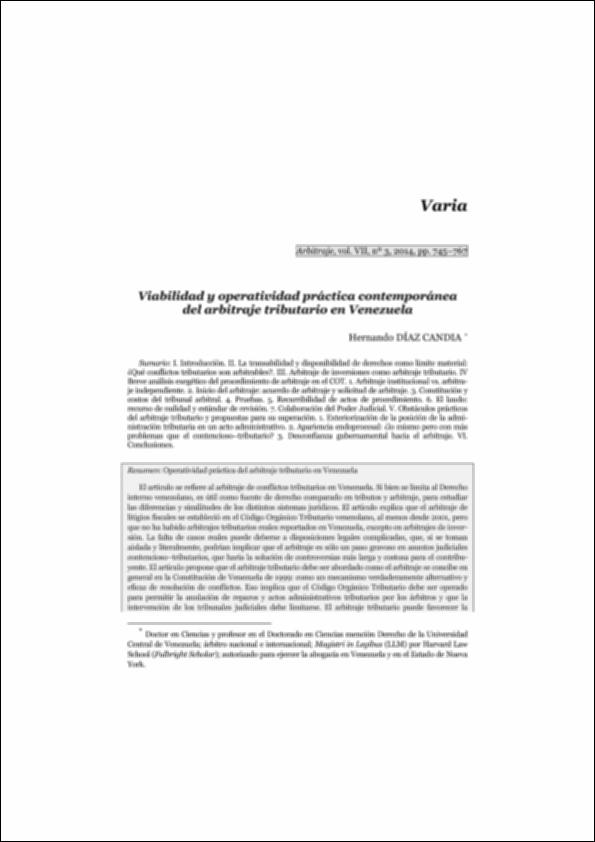Please use this identifier to cite or link to this item:
http://hdl.handle.net/10637/12773Viabilidad y operatividad práctica contemporánea del arbitraje tributario en Venezuela.
| Title: | Viabilidad y operatividad práctica contemporánea del arbitraje tributario en Venezuela. |
| Authors : | Díaz Candia, Hernando |
| Keywords: | Arbitraje tributario.; Impuestos.; Arbitration of tax disputes.; Taxes. |
| Abstract: | El artículo se refiere al arbitraje de conflictos tributarios en Venezuela. Si bien se limita al Derecho
interno venezolano, es útil como fuente de derecho comparado en tributos y arbitraje, para estudiar
las diferencias y similitudes de los distintos sistemas jurídicos. El artículo explica que el arbitraje de
litigios fiscales se estableció en el Código Orgánico Tributario venezolano, al menos desde 2001, pero
que no ha habido arbitrajes tributarios reales reportados en Venezuela, excepto en arbitrajes de inversión. La falta de casos reales puede deberse a disposiciones legales complicadas, que, si se toman
aislada y literalmente, podrían implicar que el arbitraje es sólo un paso gravoso en asuntos judiciales
contencioso–tributarios, que haría la solución de controversias más larga y costosa para el contribuyente. El artículo propone que el arbitraje tributario debe ser abordado como el arbitraje se concibe en
general en la Constitución de Venezuela de 1999: como un mecanismo verdaderamente alternativo y
eficaz de resolución de conflictos. Eso implica que el Código Orgánico Tributario debe ser operado
para permitir la anulación de reparos y actos administrativos tributarios por los árbitros y que la
intervención de los tribunales judiciales debe limitarse. El arbitraje tributario puede favorecer la percepción de justicia en el sistema tributario, lo cual ayudaría en última instancia a reducir la evasión
de impuestos. The article refers to arbitration of tax disputes in Venezuela. While it is focused on domestic Venezuelan law, it is useful as a source of comparative tax and arbitration laws to study the differences and similarities of various legal systems. The article explains that the arbitrability of tax disputes is provided in the Venezuelan Tax Code at least since 2001, but that there have been no actual tax arbitrations reported in Venezuela, except in investment arbitrations. The lack of actual cases may be due to complicated legal provisions, which, if taken isolated and literally, could imply that tax arbitration is just a burdensome step within judicial tax matters, which makes the resolution of disputes lengthier and more expensive for the taxpayer. The article proposes that tax arbitration must be approached as arbitration is generally conceived by the Venezuelan Constitution of 1999: as a truly alternative and efficient dispute resolution mechanism. That implies that the Tax Code must be construed to permit the annulment of tax assessment by arbitrators and that the intervention of judicial courts must be limited. Tax arbitration can further the perception of fairness of the tax system, which can ultimately reduce tax evasion. |
| Description: | En: Arbitraje: revista de arbitraje comercial y de inversiones. eISSN. 2603-9281. vol. 7, n. 3, 2014, pp 745-767 |
| URI: | http://hdl.handle.net/10637/12773 |
| Rights : | http://creativecommons.org/licenses/by-nc-nd/4.0/deed.es |
| Issue Date: | 11-Jun-2021 |
| Appears in Collections: | 2014 Arbitraje nº 3 |
Items in DSpace are protected by copyright, with all rights reserved, unless otherwise indicated.


